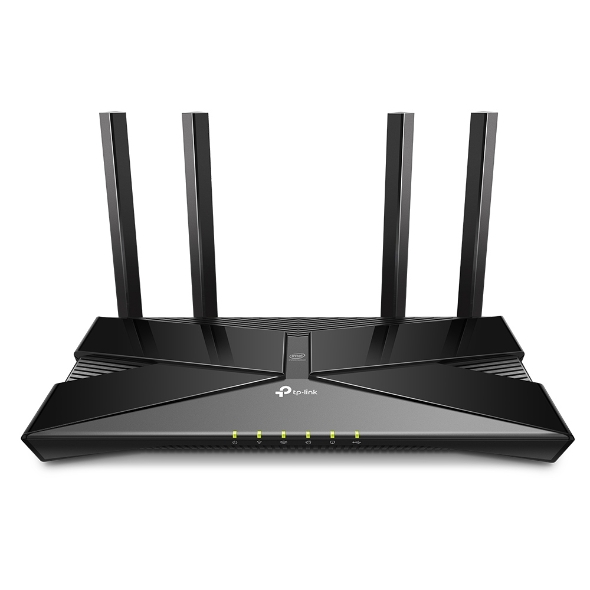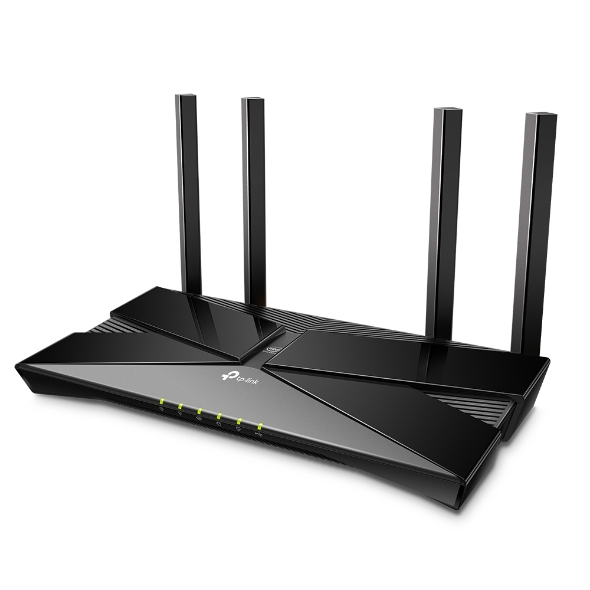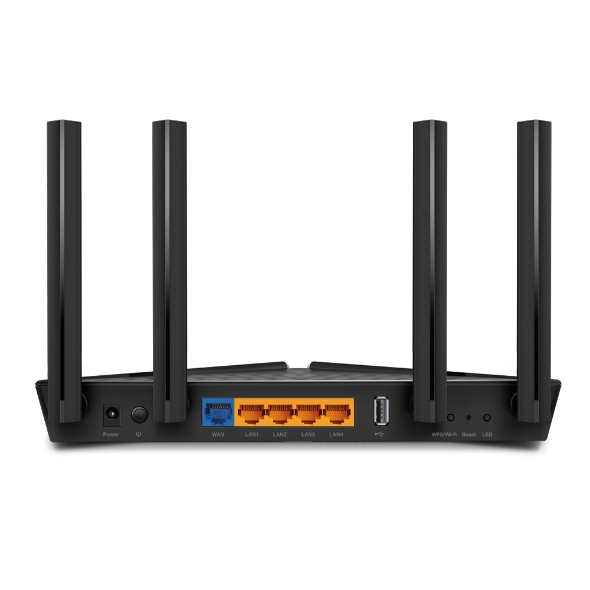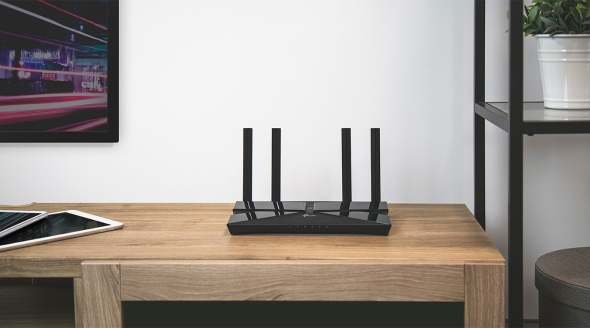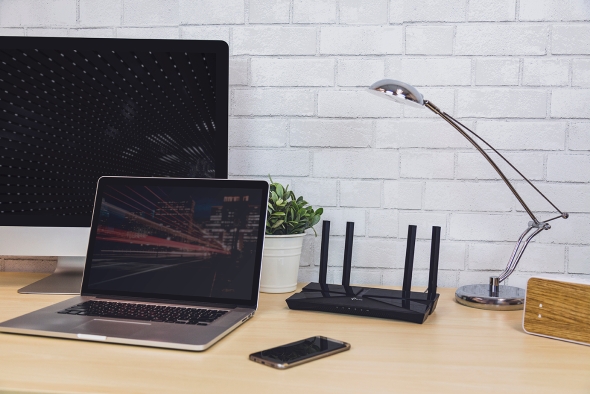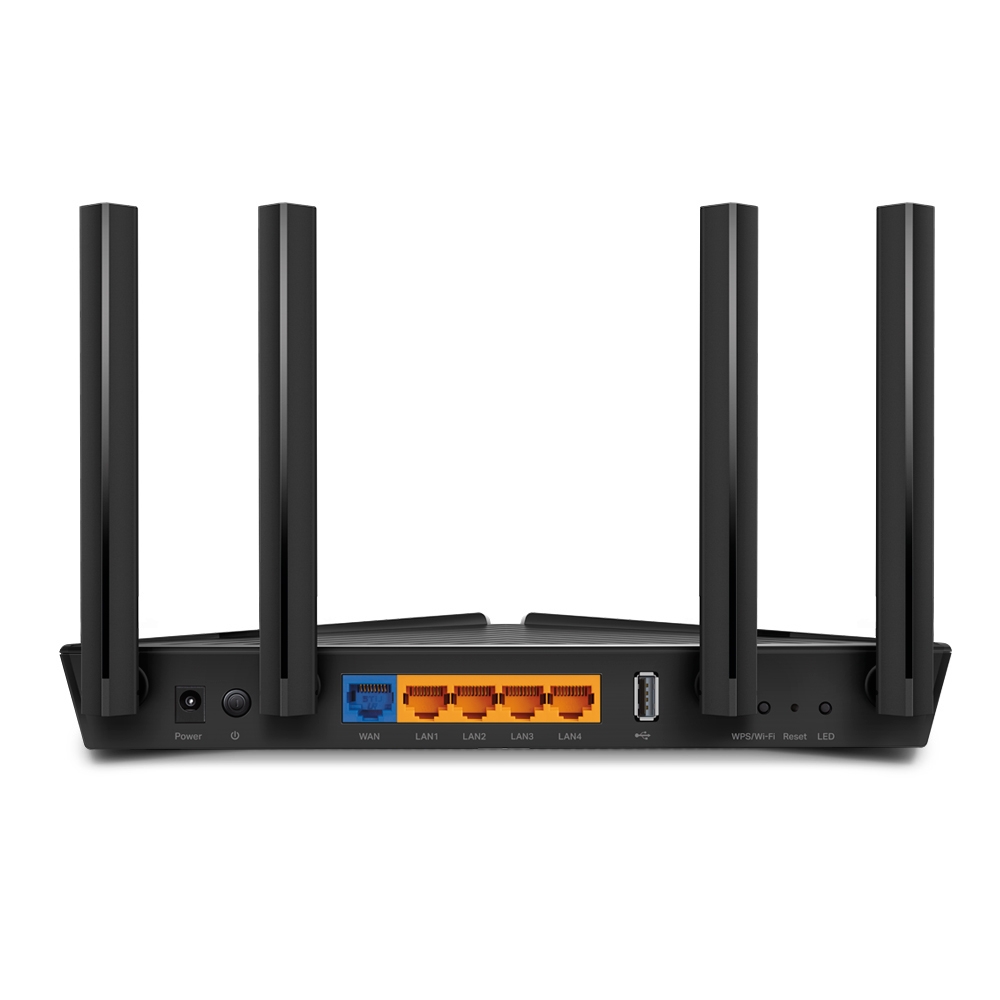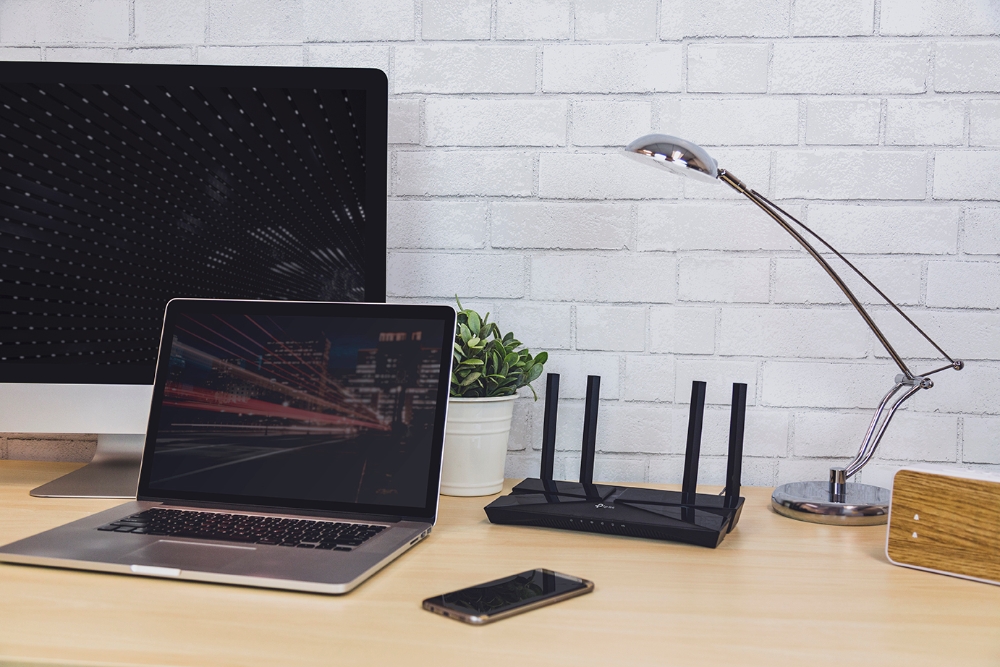AX3000 Dual Band Gigabit Wi-Fi 6 Router
- Wi-Fi 6 Technology: Wi-Fi 6 technology achieves up to 3x faster speeds, higher capacity and lower latency compared to the previous generation of Wi-Fi 5 .*†
- Next-Gen 3 Gbps Speeds: Reaches incredible speeds up to 3 Gbps (2402 Mbps on 5 GHz band and 574 Mbps on 2.4 GHz band) for faster streaming and gaming like you have never experienced before.†
- Connect More Devices: Simultaneously communicate more data to more devices using revolutionary OFDMA technology.△
- Minimize Lag for All Devices and Applications: Experience ultra-smooth entertainment whether you are streaming 4K videos, gaming online, or even video chatting.
- More Reliable Coverage: Achieve the strongest, most reliable WiFi coverage with Archer AX3000 as it focuses signal strength to your devices using Beamforming technology and four antennas.
- Easy Setup: Set up your router in minutes with the powerful TP-Link Tether App
- Backward Compatible: Archer AX3000 supports all previous 802.11 standards and all WiFi devices
Faster Speeds. More Connected Devices.
-
Wi-Fi 6
-
Up to 3 Gbps Speeds
-
More Connected Devices
-
Boosted Coverage
-
Reduced Power Consumption
The Latest Wi-Fi 6 Technology
Experience the latest Wi-Fi 6 technology, which delivers up to 3x faster speeds, higher capacity, and 75% lower latency to meet all your WiFi needs.†
Next-Generation WiFi Speeds Up to 3 Gbps
Archer AX3000 brings you incredibly fast dual-band speeds up to 3x faster than the previous AC generation of WiFi, perfect for vivid 8K/4K streaming, intense online gaming, and more.‡
More Devices. Less Congestion. Smarter Home.
A great smart home starts with a smarter router. Archer AX3000 uses OFDMA technology to organize the flow of data to talk to all your smart home, streaming and gaming devices. △
More Reliable Coverage
Achieve the strongest, most reliable WiFi coverage with Archer AX3000 as it focuses signal strength to your devices using Beamforming technology and four antennas.
Reduced Power Consumption. Increased Battery Life.
Target Wake Time (TWT) talks to your devices and negotiates when and how frequently they should transfer data to increase device sleep time, extending battery life.**

Easily Set Up and Manage Your WiFi
Set up and manage your WiFi through the TP-Link Tether app (Android, iOS). Access WiFi settings such as parental controls, guest privileges and more right from your smartphone.
| WIRELESS | |
|---|---|
| Standards and Protocols | Wi-Fi 6IEEE 802.11ax/ac/n/a 5 GHzIEEE 802.11ax/n/b/g 2.4 GHz |
| WiFi Speeds | AX30005 GHz: 2402 Mbps (802.11ax, HE160)2.4 GHz: 574 Mbps (802.11ax) |
| WiFi Range | 3 Bedroom Houses BeamformingConcentrates wireless signal strength towards clients to expand WiFi rangeHigh-Power FEMImproves transmission power to strengthen signal coverage |
| WiFi Capacity | High Dual-BandAllocate devices to different bands for optimal performanceOFDMASimultaneously communicates with multiple Wi-Fi 6 clientsAirtime FairnessImproves network efficiency by limiting excessive occupationDFSAccess an extra band to reduce congestion4 StreamsConnect your devices to more bandwidth |
| Working Modes | Router ModeAccess Point Mode |
| SECURITY | |
|---|---|
| Network Security | SPI FirewallAccess ControlIP & MAC BindingApplication Layer Gateway |
| Guest Network | 1× 5 GHz Guest Network1× 2.4 GHz Guest Network |
| VPN Server | • OpenVPN Server • PPTP VPN Server • L2TP VPN Server |
| VPN Client | • Open VPN Client • PPTP VPN Client • L2TP VPN Client |
| WiFi Encryption | WPA WPA2 WPA/WPA2-Enterprise (802.1x) WPA3 (V2.0) |
| HARDWARE | |
|---|---|
| Processor | Powerful CPU |
| Ethernet Ports | 1× Gigabit WAN Port4× Gigabit LAN Ports |
| Buttons | Reset ButtonWPS Button |
| Power | 12 V ⎓ 1.5 A |
| SOFTWARE | |
|---|---|
| Protocols | IPv4IPv6 |
| OneMesh™ | OneMesh™ SupportedWithout replacing your existing devices or buying a whole new WiFi ecosystem, OneMesh™ helps you create a more flexible network that covers your entire home with TP-Link OneMesh™ products. Learn More>All OneMesh Products> |
| EasyMesh | Mesh networking creates smooth, fast, stable roaming. ArcherAX3000 can build an EasyMesh network with devices that use EasyMesh technology. It also works with other TP-Link products to create a OneMesh network. Eliminate Wi-Fi dead zones, expand your network, and fill your entire home with high-speed Wi-Fi.Learn More> |
| Parental Controls | URL FilteringTime Controls |
| WAN Types | Dynamic IPStatic IPPPPoEPPTPL2TP |
| Quality of Service | QoS by Device |
| Cloud Service | Auto Firmware UpgradeOTA Firmware UpgradeTP-Link IDDDNS |
| NAT Forwarding | Virtual ServersPort ForwardingPort TriggeringDMZUPnP |
| IPTV | IGMP ProxyIGMP SnoopingBridgeTag VLAN |
| DHCP | Address ReservationDHCP Client ListServer |
| DDNS | TP-LinkNO-IPDynDNS |
| Management Features | Tether AppWebpageCheck Web Emulator> |
| OTHER | |
|---|---|
| System Requirements | Internet Explorer 11+, Firefox 12.0+, Chrome 20.0+, Safari 4.0+, or other JavaScript-enabled browserCable or DSL Modem (if needed)Subscription with an internet service provider (for internet access) |
| Certifications | FCC, CE, RoHS |
| Environment | Operating Temperature: 0℃~40℃ (32℉ ~104℉)Storage Temperature: -40℃~70℃ (-40℉ ~158℉)Operating Humidity: 10%~90% non-condensingStorage Humidity: 5%~90% non-condensing |
| TEST DATA | |
|---|---|
| WiFi Transmission Power | CE: <20dBm(2.4GHz)<23dBm(5.15GHz~5.35GHz)<30dBm(5.47GHz~5.725GHz)FCC:<30dBm(2.4GHz & 5.15GHz~5.825GHz) |
| WiFi Reception Sensitivity | 5 GHz:11a 6Mbps:-97dBm, 11a 54Mbps:-79dBm11ac VHT20_MCS0:-96dBm, 11ac VHT20_MCS11:-66dBm11ac VHT40_MCS0:-94dBm, 11ac VHT40_MCS11:-63dBm11ac VHT80_MCS0:-91dBm, 11ac VHT80_MCS11:-60dBm11ac VHT160_MCS0:-88dBm, 11ac VHT160_MCS11:-55dBm11ax HE20_MCS0:-95dBm, 11ax HE20_MCS11:-63dBm11ax HE40_MCS0:-92dBm, 11ax HE40_MCS11:-60dBm11ax HE80_MCS0:-89dBm, 11ax HE80_MCS11:-58dBm11ax HE160_MCS0:-85dBm, 11ax HE160_MCS11:-55dBm2.4 GHz:11g 6Mbps:-97dBm, 11a 54Mbps:-79dBm11n HT20_MCS0:-97dBm, 11n HT20_MCS7:-78dBm11n HT40_MCS0:-95dBm, 11n HT40_MCS7:-75dBm11ac VHT20_MCS0:-96dBm, 11ac VHT20_MCS11:-67dBm11ac VHT40_MCS0:-94dBm, 11ac VHT40_MCS11:-64dBm11ax HE20_MCS0:-96dBm, 11ax HE20_MCS11:-64dBm11ax HE40_MCS0:-93dBm, 11ax HE40_MCS11:-61dBm |
| PHYSICAL | |
|---|---|
| Dimensions (W×D×H) | 6.5 × 6.2 × 1.8 in(166 × 157 × 45 mm) |
| Package Content | Wi-Fi Router Archer AX3000Power AdapterRJ45 Ethernet CableQuick Installation Guide |
†Claims about 802.11ax Wi-Fi technology are based on comparisons of the expected maximum theoretical data rates for one spatial stream using 802.11ax at 160 MHz (1201 Mbps) as opposed to one spatial stream using 802.11ac at 80 MHz (433 Mbps) as documented in IEEE 802.11ax draft 3.0 spec and IEEE 802.11-2016 wireless standard specifications, and require the use of similarly configured 802.11ax wireless network routers.
Use of 802.11ax Wi-Fi standard requires clients to also support the 802.11ax Wi-Fi standard.
‡802.11ax 2x2 160MHz enables 2402Mbps maximum theoretical data rates, 3X faster than standard 802.11ac 2x2 80MHz (867Mbps) and nearly 6x faster than baseline 1x1ac (433Mbps) Wi-Fi as documented in IEEE 802.11 wireless standard specifications, and require the use of similarly configured 802.11ax wireless network routers.
§Up to 75% lower latency” is based on Intel simulation data of 802.11ax with and without OFDMA using 9 clients. Average latency without OFDM is 36ms, with OFDMA average latency is reduced to 7.6ms. Latency improvement requires that the AP and all clients support OFDMA.
***Capacity refers to overall average throughput. This amendment defines standardized modifications to both the IEEE 802.11 physical layers (PHY) and the IEEE 802.11 Medium Access Control layer (MAC) that enable at least one mode of operation capable of supporting at least four times improvement in the average throughput per station (measured at the MAC data service access point) in a dense deployment scenario, while maintaining or improving the power efficiency per station.
**Saving clients' battery power requires clients to also support the 802.11ax Wi-Fi standard. Actual power reduction may vary as a result of network conditions, client limitations, and environmental factors.
△Use of OFDMA requires clients to also support OFDMA
Actual network speed may be limited by the rate of the product's Ethernet WAN or LAN port, the rate supported by the network cable, Internet service provider factors and other environmental conditions.
